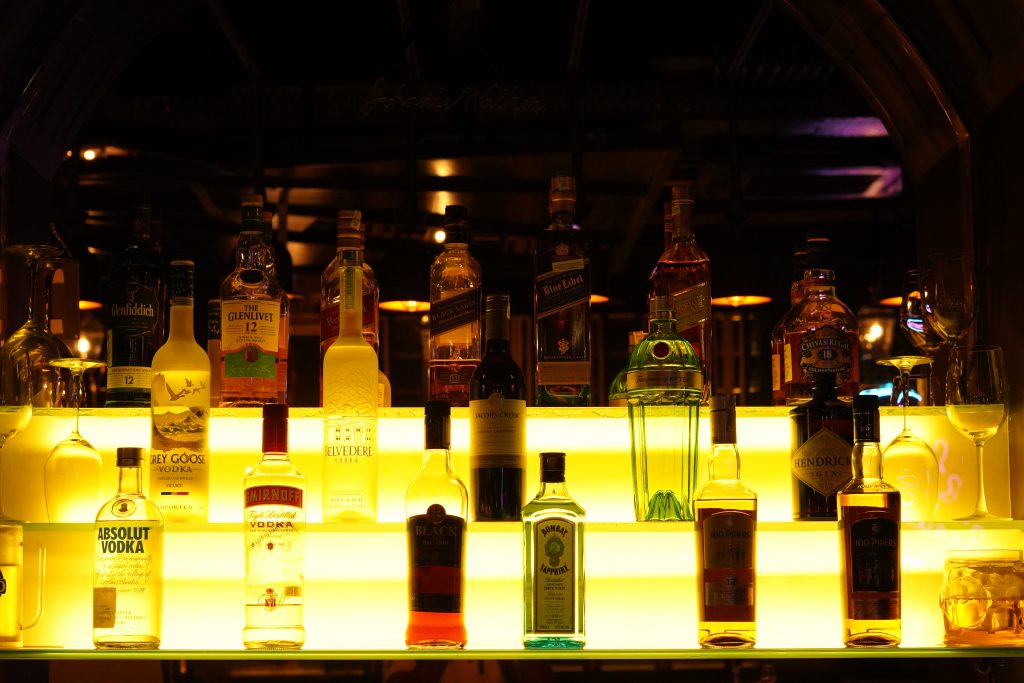The government has earmarked a portion of liquor shops for specific social groups. Of the total shops, 15 percent will be reserved for members of the Goud community, 10 percent for Scheduled Castes, and 5 percent for Scheduled Tribes.
Published Aug 21, 2025 | 2:57 PM ⚊ Updated Aug 21, 2025 | 2:57 PM

Liquor shop (Creative Commons)
Synopsis: Telangana has increased liquor shop application fee to ₹3 lakh for the 2025–27 license period. 2,620 shops will be allotted via lottery, with reservations for Gouds, SCs, and STs. Tax rates remain unchanged, and automated monitoring is mandated. Walk-in stores, MRP adherence, CCTV, and public awareness campaigns are required.
Applicants for licences for opening retail liquor shops in Telangana, including individuals, partnerships, and companies, will have to pay ₹1 lakh more this time, making it ₹3 lakh.
The notification issued by Telangana on the allotment process and operational guidelines for retail liquor (A4) shops across the state for the upcoming two-year license period, from 1 December, 2025, to 30 November, 2027, laid down the new rules and regulations.
The applicants will be allowed to submit multiple applications for a single shop, provided each is accompanied by the prescribed non-refundable application fee of ₹3 lakh. Licenses for liquor shops will be granted through a transparent draw of lots conducted by district collectors. The total number of shops will be 2,620.
The order, released through G.O. Ms. No. 93 by the Revenue (Excise) Department, explains the framework covering application procedures, reservation policies, excise taxation, monitoring systems, and measures to address the social impact of alcohol consumption.
The government has earmarked a portion of liquor shops for specific social groups. Of the total shops, 15 percent will be reserved for members of the Goud community, 10 percent for Scheduled Castes, and 5 percent for Scheduled Tribes.
Only individuals belonging to these reserved categories will be eligible to apply for shops under the quota. Selection will also be done through a lottery system overseen by the district collectors to ensure fairness.
The government has decided to continue with the existing Retail Shop Excise Tax (RSET) slabs from the previous 2023–25 licensing period. Taxes will vary depending on the population size of the area, ranging from ₹50 lakh per annum in villages with populations up to 5,000 to ₹1.1 crore in urban centres with populations above 20 lakh.
Shops located on the peripheries of major cities, including Hyderabad and other municipal corporations, will pay the same tax rates as those within the corporation limits.
Licensees will be required to pay the annual excise tax in six equal instalments and furnish a bank guarantee equivalent to one-fourth of the annual tax liability for the 25-month license period. A turnover tax at 10 percent will also be imposed when annual purchases exceed ten times the annual excise tax.
The operating hours for liquor shops remain unchanged. Outlets within Hyderabad and its surrounding areas will function from 10 a.m. to 11 p.m., while those in other areas will close an hour earlier, at 10 p.m.
Strict adherence to the Maximum Retail Price (MRP) printed on liquor bottles has been mandated. Any sale above or below the prescribed price will attract penal action under the Telangana Excise Act, 1968. Retailers will retain margins of 27 percent on ordinary liquor, 20 percent on premium categories, and 20 percent on beer, consistent with the current policy.
The government will continue to permit liquor shops to be converted into walk-in stores upon payment of an additional fee of ₹5 lakh per year. Such outlets will also be allowed to sell liquor-related accessories, including glasses, ice buckets, and corkscrews.
All shops will be required to adopt automated systems for real-time transaction updates. They must also install three CCTV cameras inside the premises, with live links to the Excise Department’s central monitoring system and the state’s Integrated Command and Control Centre.
Acknowledging the harmful social and health consequences of alcohol consumption, the government has promised to launch awareness campaigns to educate the public about the ill effects of drinking. Plans are also underway to set up de-addiction centers in collaboration with the Health and Family Welfare Department.
In case any liquor shop remains undisposed after the allotment process, the Commissioner of Prohibition and Excise has been empowered either to allow the Excise Department or the Telangana Beverages Corporation Limited to run such outlets, or to re-notify them for bidding.
(Edited by Sumavarsha)
